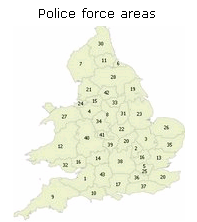Pleasing reversal of the week
 The Home Office finally put a stop to its plans for police force mergers (The Times). The mixture of big-gesture, tidying-up and map-redrawing instincts that were driving this (with the flimsiest evidence base as a cover) were thwarted the moment value-for-money became a consideration. The ambition for reform has been steadily watered down from the bullish imposition 'strategic forces' (see Home Office statement 11 Nov 2005) to agreeing just to voluntary mergers, then abandoning even that. The whole reversal can be charted on what is surely a soon-to-be-removed Home Office page.
The Home Office finally put a stop to its plans for police force mergers (The Times). The mixture of big-gesture, tidying-up and map-redrawing instincts that were driving this (with the flimsiest evidence base as a cover) were thwarted the moment value-for-money became a consideration. The ambition for reform has been steadily watered down from the bullish imposition 'strategic forces' (see Home Office statement 11 Nov 2005) to agreeing just to voluntary mergers, then abandoning even that. The whole reversal can be charted on what is surely a soon-to-be-removed Home Office page.
But why be against force mergers? Well it the current structure is certainly not how it would be designed from scratch, but the costs and opportunity costs of change are the reason to do something different. The costs have been estimated at over £1 billion, but that doesn't account for any loss of effectiveness. In my opinion, it is the distraction and opportunity costs that should sink the idea - mergers don't really address the key challenges:
- fragmentation in IT and 'knowledge' systems as highlighted by Bichard in the case of dangerous individuals- but there are many other examples of poorly joined-up systems
- the fact the the 'geography' of crime is not arranged on convenient administrative borders - for example crime in North Wales is more closely linked to Manchester and Merseyside than South Wales. Much crime has a London dimension, but no-one suggests merging everything with the Met
- the need for much more co-operation, joint problem-orientated working, a means of distributing police capacity to where it is needed... none solved by mergers
- the need for national organisation of some functions - for example terrorism, trafficking - overlaid over the localised structure.
- the ever increasing need for specialisation, best organised at very large scale and usually involving London



No comments:
Post a Comment